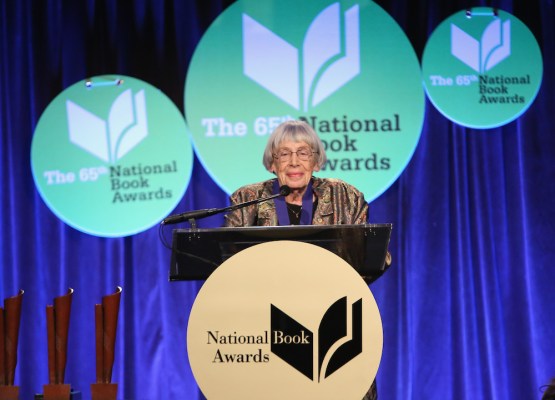All-time great science fiction and fantasy writer Ursula Le Guin died Monday. She was 88 years old.
Her son Theo confirmed the news to The New York Times. He declined to identify the cause of death, aside from saying that she had been in poor health for several months.
Le Guin didn’t always enjoy being called a science fiction writer, and she received acclaim far beyond the genre — she won National Book Awards, published stories in The New Yorker and saw her work collected by the Library of America.
Still, she remains best known for The Left Hand of Darkness, about a planet whose inhabitants have no fixed gender identity, and for the six-book fantasy series that began with A Wizard of Earthsea.
Published in 1969, The Left Hand of Darkness was one of the first major science fiction novels to seriously (and subversively) discuss sex and gender, and it made Le Guin the first woman to win the Hugo and Nebula awards for best novel.
A New Yorker profile describes Le Guin’s upbringing by her father, anthropologist Alfred Kroeber, and her mother, Ishi in Two Worlds author Theodora Kroeber — so it’s no surprise to find a strong anthropological bent in her work. Many of her best-known stories, including Left Hand, center on a visitor struggling to understand the customs of an alien world (alien to them, at least).
Her work was also marked by loving descriptions of the natural world (even if it was the natural world of an imagined planet), and by her ability to give dramatic shape to complex political ideas — she won the Hugo and Nebula again for The Dispossessed, a long utopian novel that contrasts the capitalist planet of Urras with the anarchist world of Anarres. (Le Guin was careful to show that both worlds had their faults, but she admitted, “My heart belongs to Anarres!”)
While her ’60s and ’70s work made the biggest impact, Le Guin continued writing fiction, nonfiction and poetry into her 80s. In a 2014 speech at the National Book Awards, she insisted that authors have to resist “letting commodity profiteers sell us like deodorant, and tell us what to publish, what to write.”
Le Guin was and is one of my favorite writers, of any genre. When Cloud Atlas author David Mitchell wrote recently that “Earthsea is a superior creation to Middle-earth,” I found myself nodding vigorously. Although I first discovered her work when I was a teenager, I never stopped reading her, and I’ve returned to The Dispossessed and A Wizard of Earthsea again and again, with undiminished pleasure.
Le Guin was also an author who faced the question of death directly — most memorably in the third Earthsea novel, The Farthest Shore. Tonight, I find myself thinking of her words, as spoken by the wizard Ged:
Nothing is immortal. But only to us is it given to know that we must die. And that is a great gift: the gift of selfhood. For we have only what we know we must lose, what we are willing to lose …. That selfhood which is our torment, and our treasure, and our humanity, does not endure. It changes; it is gone, a wave on the sea. Would you have the sea grow still and the tides cease, to save one wave, to save yourself?
